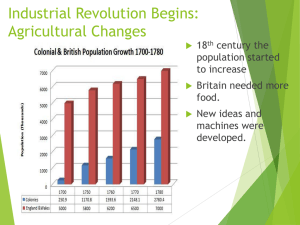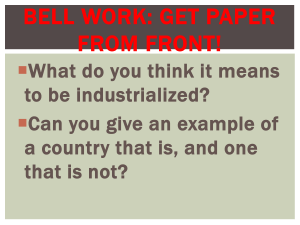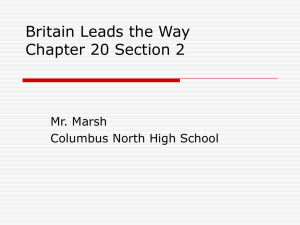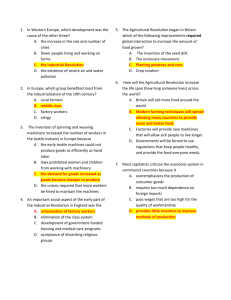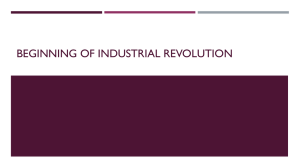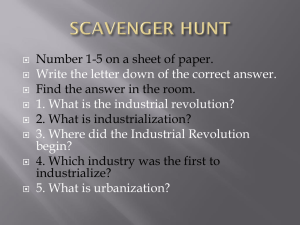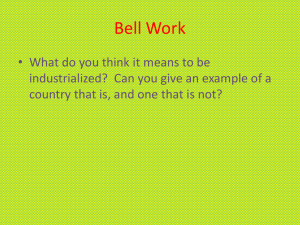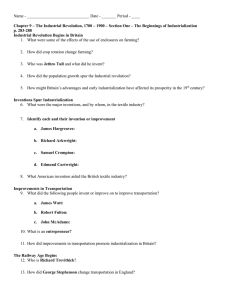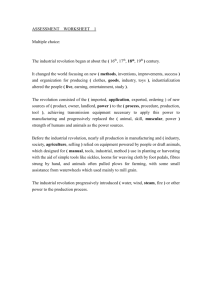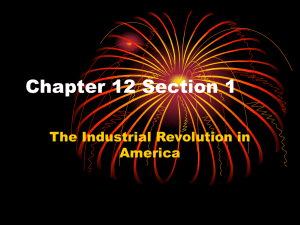World History II Final Exam Review
advertisement
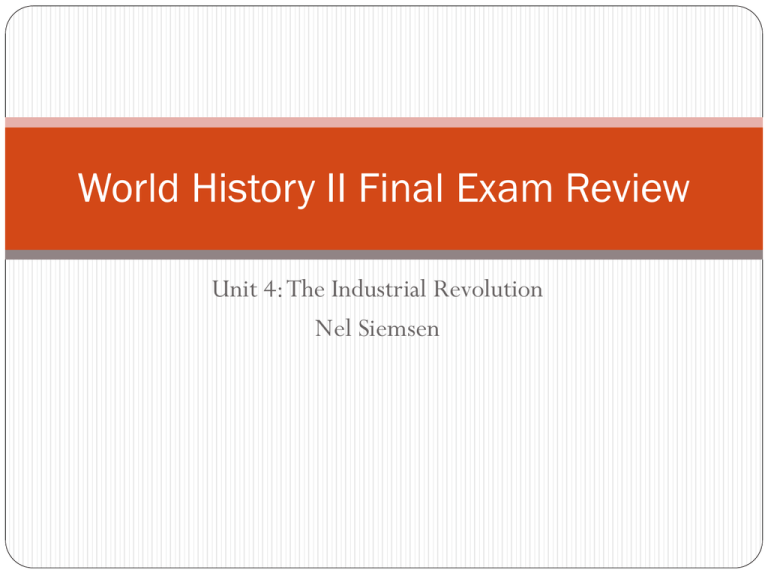
World History II Final Exam Review Unit 4: The Industrial Revolution Nel Siemsen Agricultural Revolution Britain had extremely productive agriculture: Tenant/landlord relationship changed: peasants paid commercial rents to landowners in a business relationship Enclosure Acts: Laws passed in England in the late 1700s to 1800s that converted public lands held in common into parcels of land to be sold to private owners. As agricultural productivity increased, textile manufacture increased Invention: Seed drill, 1701: Jethro Tull—increased agricultural productivity Textile Manufacture Revolution Textile industry increased British jobs, as they imported cotton from India Inventions replaced people as fewer and fewer people were needed in manufacture Inventions: Spinning jenny (1764), “water frame” (1769), “spinning mule” (1779), power loom (1785), cotton gin (1793) Thomas Newcomen—used steam power to drive water pumps in mine shafts (1712) James Watt and Matthew Boulton—developed steam engines (1785) Textiles dominated British exports, as they increase quantity and quality New technology displaced workers—caused Luddite Riots (18101820)—anti-mechanization people destroyed machines and technology Industrialization of Britain Coal was used to melt iron, rather than wood—more efficient Iron industry coincided with the inventions of the railroads, Steam engine Railroad track Locomotives Steamships New urban systems of gas supply and solid and liquid waste disposal Rocket: first reliable locomotive (1829) – 16mph Transatlantic steamships (1838): world steamship tonnage increased more than 100x Working Conditions Michael Thomas Sadler (1831): investigated the conditions of child labor in cotton and linen factories Children began work at age 6, and worked 12-14 hr days, had bad food, cramped, dirty, conditions Committee on the Conditions in Mines (1842) Investigations revealed children worked 14hrs underground/day Sir Edwin Chadwick, investigator for Royal Commission on the Poor Laws Urged further legislation to provide for sewage, drainage, sanitation, and potable water Inspired Public Health Act of 1848 and a Board of Health Gender Relationships Employment for wives moved away from home, into factories Family wage instituted – men were paid more than women on the principle that they had to provide for an entire family Women brought back into the home Domesticity: women’s roles returned to a family-oriented lifestyle: caregivers and nurturers Living standards rose: ventilation heating, lighting, indoor plumbing, and running water Family planning increased, as children attended free, mandatory school in 1830s-1840s Women jobs: teachers, nurses—fit defined roles Women gained some political power through their husbands Political Reactions: 1800-1914 In Britain, government tried to restrict power of people: Peterloo Massacre (1819): peaceful protest against Corn Laws, for universal male suffrage, and annual election of the House of Commons—government fired on. 1832: Whig party forces through Reform Bill of 1832 (shifted seats from rural constituencies to urban) to prevent revolutions Factory Act of 1833: forbade employment of children under age of 9 in textile mills Poor Law (1834): provided adequate assistance to sustain life Municipal Corporations Act (1835): Reformed elections and administrations in large cities to better prepare them for industrialization 1842: employment of women and of children under age 10 forbidden Ten Hour Act of 1847: limited working hours The Chartists: presented a Charter to parliament for universal male suffrage 1918: Britain adopts universal male suffrage for men 21+ Emmeline and Christabel Pankhurst formed violent suffragette organizations for women’s suffrage 1918: women over 30 gain voting rights 1928: Representation of the People Act: women have equal voting rights to men Labor Organization Combination Act of 1799, repealed in 1824: forbade workers from unionizing Trade Union Act of 1871: workers gained the right to strike London Dock strike (1889): working-class strength demonstrated, closed down dock Labour Party (1900): working-class party won parliament seats Karl Marx: called for worker-led revolution Wealth comes from the proletariat (laborers) Marx called for graduated income tax, free education, abolition of child factory labor, abolition of private property Perpetual class struggle: proletariat vs. bourgeoisie Revolution never occurred: unions won demands for higher pay, shorter hours, and better working conditions, assimilated to new worker organizations and accommodated demands, worker-favoring legislation passed, Labour party took its place in Parliament
